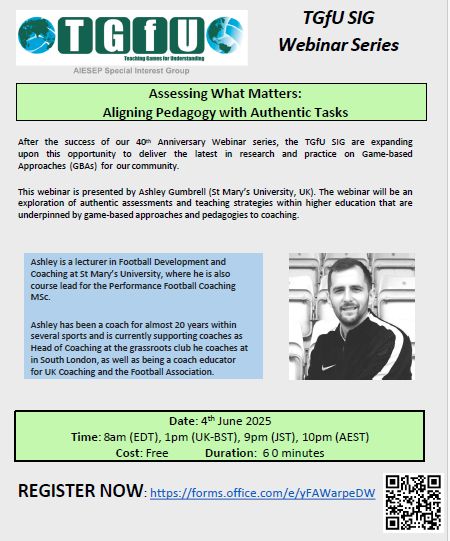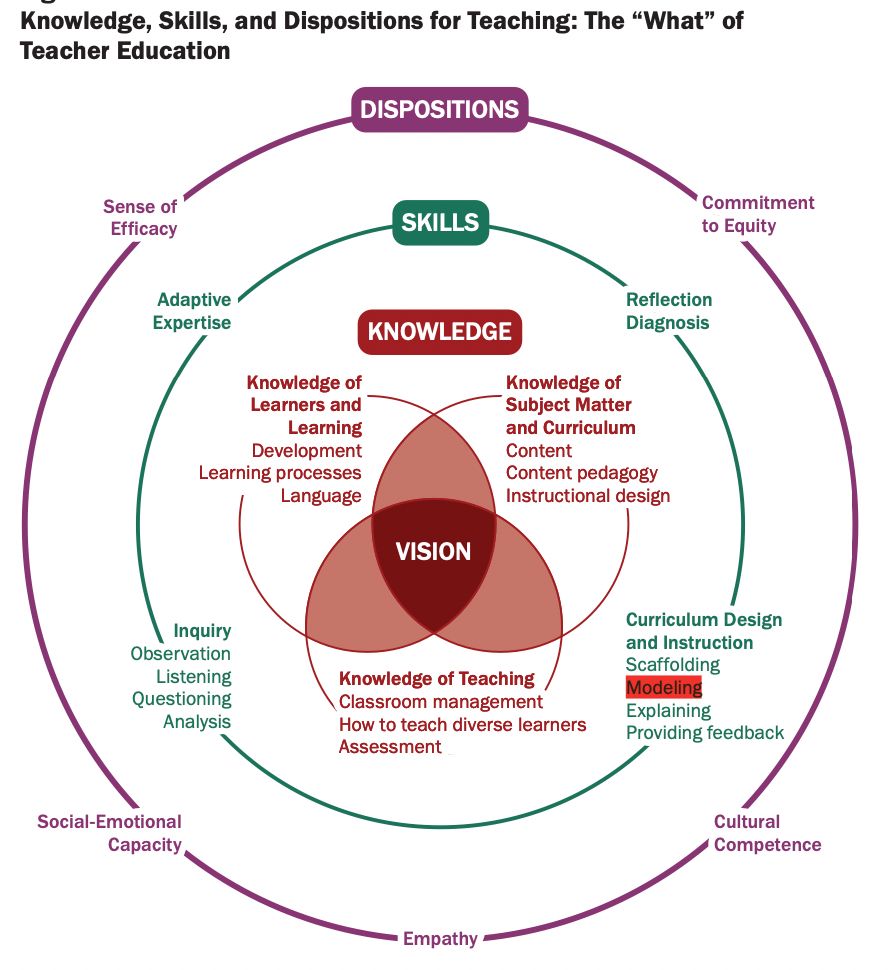
Upcoming Webinar!
Please register using the QR code or via forms.office.com/e/yFAWarpeDW
Please note this will be recorded and included on the TGfU SIG website.

Upcoming Webinar!
Please register using the QR code or via forms.office.com/e/yFAWarpeDW
Please note this will be recorded and included on the TGfU SIG website.
As an academic I’ve been part of book clubs and journal clubs as a form of professional development, but never practice clubs.
What’s a practice club? Where we would video our practice, share it with others and then meet to discuss what we say, what we do, how we relate and purposes behind them.
The 2nd paper in my edited Education Sciences SI focusing on the learning & dev of PE teacher/sport coaches is now available! Congratulations to Alice Mees and colleagues for their paper exploring cognitive apprenticeship to develop adventure sport coaches: www.mdpi.com/2227-7102/15...
26.02.2025 12:01 — 👍 2 🔁 1 💬 0 📌 0Calling all Qualitative Researchers: Our new research explores how AI could assist qualitative data analysis. We want to find out what qualitative researchers think about the prospect of using AI to analyse qualitative data. Please consider completing our survey: tinyurl.com/QUAILresearch
27.02.2025 11:22 — 👍 5 🔁 9 💬 3 📌 0
Why do teachers in some schools keep getting better for longer?
We are developing a new measure of teacher workplace social capital to find out: blogs.ucl.ac.uk/cepeo/2025/0...
Save the Date:
Webinar: Assessing What Matters: Aligning Pedagogy with Authentic Tasks
Speaker: Ashley Gumbrell (St Mary's University, UK)
Date and Time: 4th June at 1pm (UK-time)
More details and registration form coming soon.
That in teacher education we have limited amount of time, so we need to be intentional about what we teach, how we teach it and how we get novices to practice in preparation for the what they will face in school and their classroom.
03.03.2025 07:15 — 👍 0 🔁 0 💬 0 📌 0Whilst there are a number of critiques about practice based pedagogy (that is training not education, that it focuses on observable behaviours and not professional judgement and decision making etc.) what I really like about it, is that it asks the teacher educator to be intentional.
03.03.2025 07:15 — 👍 0 🔁 0 💬 1 📌 0Finally their is approximations of practice refers to creating simplified models of real-life professional situations to provide novices with opportunities to practice and develop their professional skills and expertise, with on time support and feedback.
03.03.2025 07:15 — 👍 0 🔁 0 💬 1 📌 0Decomposition is about how we break down complex practices to more effectively teacher and student to learn. The is is done by giving it a shared language for it to be identified, observed, understood, analysed and reflected upon. Doing this well can make facets of practice visible.
03.03.2025 07:15 — 👍 0 🔁 0 💬 1 📌 0Representation is about the way we make practice visible and accessible to novices. This could include videos, teacher educator modelling, case studies, planning templates, classroom transcripts and classroom observations.
03.03.2025 07:15 — 👍 0 🔁 0 💬 1 📌 0
They identified three concepts for understanding the pedagogies of practice in professional education (and therefore teacher education):
1. representation of practice
2. decomposition of practice
3. approximation of practice

This study by Pam Grossman and colleagues looked to develop a framework for thinking about the teaching of ‘practice’. This was done via cross-professional comparison of human improvement professions (clergy, clinical psychology and teaching).
journals.sagepub.com/doi/10.1177/...

Don't forget! Our next #AIESEPConnect session on Feb 28th, 11am CET!
Hosted by the AIESEP TGfU SIG, this event will explore how TGfU can evolve to meet contemporary educational needs.
📅 Feb 28th, 2025
🕒 11:00 am CET
Finally Lampert questions the composition of the teacher education workforce & whether they are capable of choosing appropriate practices for pre-service teachers to learn (she doesn’t think this should be left to individuals) + how to organise practice so it enhances learning more than experience.
27.02.2025 07:18 — 👍 0 🔁 0 💬 0 📌 0
She also asks this wonderful question about local cultures and whether teacher education can be useful in a universal way.
I don’t have a good answer to that.
It challenges the idea that practice is just doing, seen in opposition of theory, is unhelpful. The job of teaching requires both thought and action if we are to prepare students for the realities of teaching (and help those who are already teaching get better).
27.02.2025 07:18 — 👍 0 🔁 0 💬 1 📌 0
Such a thought proving paper by Lampert (2010) doi.org/10.1177/0022... which explores the “messy terrain in which ‘practice’ resides” which regards to teaching and learning to teach.
27.02.2025 07:18 — 👍 0 🔁 0 💬 1 📌 0
What we teach may go into our students’ memory but it isn’t learning if nothing is retained and it can’t be recalled and used next week, month, or year. What it is, is performance: The student performed!
#EduSky
3starlearningexperiences.wordpress.com/2025/01/09/w...
From Ball and Forzani (2009)
bsky.app/profile/pete...

That teaching is a relational activity is for me a truism. However in this paper by Ball and Forzani (2009) doi.org/10.1177/0022... they visualise the relationships teaching should be concerned about. It’s about intentionally using professional knowledge to make these fruitful relationships.
25.02.2025 08:28 — 👍 1 🔁 0 💬 1 📌 1

The “what” and the “how” of teacher education as foundations to teacher education. files.eric.ed.gov/fulltext/ED6...
Coherence between vision, the knowledge, skills and dispositions we want to develop and an effective pedagogy of teacher education is key.
A teacher should be able to know what they are trying to teach, what methods are developmentally appropriate and effective, how they might be organised & implemented within the context & how to determine whether the teaching was successful.
24.02.2025 06:53 — 👍 0 🔁 0 💬 0 📌 0
Joyce and Harootunian (1964) see teaching as problem solving. This means that every time there is an educational objective to achieve, then the teacher is faced with an educational problem. It becomes teacher education responsibility to prepare them for this.
journals.sagepub.com/doi/10.1177/...

This is not a simple thing to do. As White (2011) explains this is a cognitive challenge - doi.org/10.1080/1941.... It requires the teacher educator to do multiple things simultaneously- including understanding their own beliefs about teaching, how that applies to practice & teaching with integrity.
23.02.2025 11:32 — 👍 1 🔁 0 💬 0 📌 0The congruency principles would require teacher educators to teach in the manner they are advocating for and to draw upon the theories they are explaining to student teachers to inform their own practice.
23.02.2025 11:32 — 👍 0 🔁 0 💬 1 📌 0
As teacher educators in part “teach about teaching” then they should deliberately consider the “congruency principle” (Dengerink and Lunenberg, 2020 - hdl.handle.net/1871.1/1e73f...).
23.02.2025 11:32 — 👍 1 🔁 0 💬 1 📌 0
Excited to share an opportunity to join the Physical Education and Sport Pedagogy (PESP) team!
We're recruiting a Managing Editor to help shape the future of research in PE and youth sport.
Learn more & apply: think.taylorandfrancis.com/editor_recru...